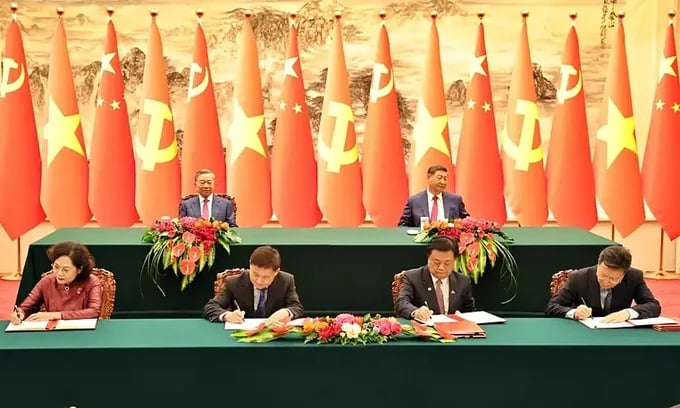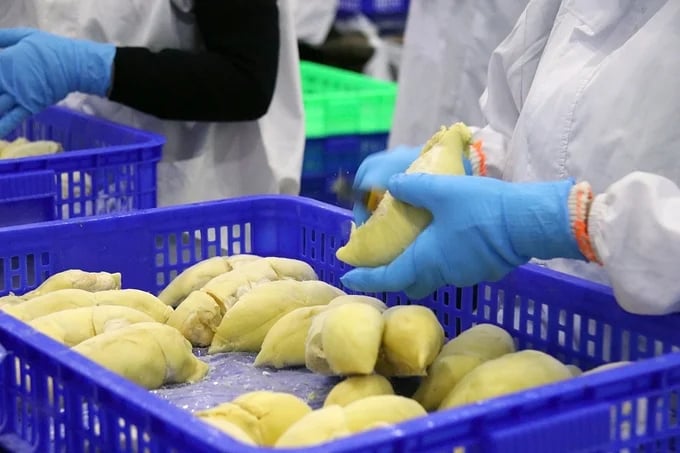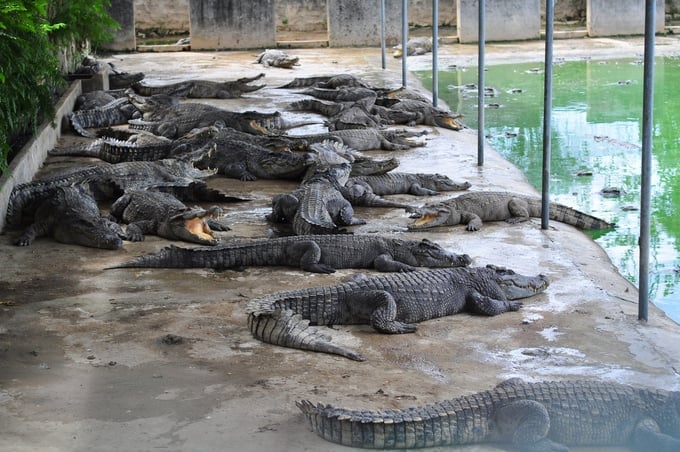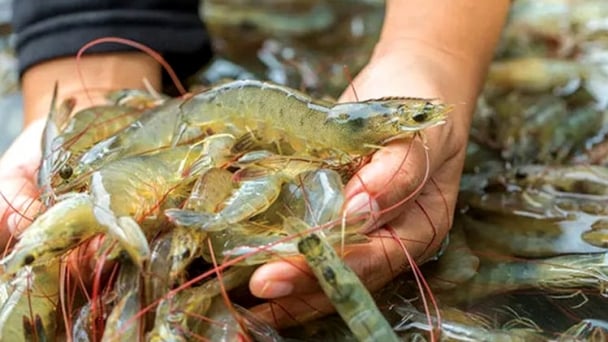May 24, 2025 | 06:34 GMT +7
May 24, 2025 | 06:34 GMT +7
Hotline: 0913.378.918
May 24, 2025 | 06:34 GMT +7
Hotline: 0913.378.918

General Secretary and President To Lam and General Secretary and President of China Xi Jinping witnessed the signing ceremony. Photo: VNA.
The signing ceremony was held during the State visit of General Secretary and President To Lam to the People's Republic of China. It opens the door for the export of fresh coconuts, frozen durians, and crocodile products to the Chinese market – a crucial advancement for Vietnam's agricultural sector.
The Protocols signed include Protocol on inspection, plant quarantine and food safety for frozen durian exported from Vietnam to China Protocol on plant quarantine requirements for fresh coconut exported from Vietnam to China, and Protocol on quarantine and health requirements for farmed crocodiles exported from Vietnam to China.
Following the signing, Minister of Agriculture and Rural Development Le Minh Hoan praised the event as the culmination of active discussions and negotiations between the specialized units of Vietnam's Ministry of Agriculture and Rural Development and China's General Department of Customs.
“We believe this will significantly boost agricultural exports, particularly the newly approved products to the Chinese market, and contribute to the growth of Vietnam's agricultural sector,” the Minister stated.
Moving forward, the Ministry of Agriculture and Rural Development is committed to closely collaborating with the General Administration of Customs of China to implement the next steps following the signing of these protocols. This collaboration ensures a smooth process for Vietnamese enterprises exporting these products to China.

Official export of frozen durian helps alleviate seasonal pressure on people. Photo: Minh Quy.
In addition to facilitating the export of these specific products, the newly signed protocols are expected to strengthen overall agricultural cooperation between Vietnam and China. The agreements are a testament to the growing economic ties and mutual trust between the two nations.
Minister Le Minh Hoan emphasized the importance of these protocols for the immediate export opportunities they present and the long-term prospects of Vietnam's agricultural sector in the global market. "By ensuring our products meet China's rigorous standards, we demonstrate our commitment to quality and safety, which will open doors to other international markets as well," he added.
The Ministry also highlighted the role of Vietnamese farmers and enterprises in maintaining the high standards required by the Chinese market. "This achievement is a collective effort. It reflects our farmers' dedication and hard work, who have embraced new technologies and practices to meet international requirements," Minister Hoan noted.
As part of the next steps, the Ministry of Agriculture and Rural Development plans to conduct workshops and training sessions to ensure that all stakeholders, from farmers to exporters, are fully informed about the new protocols and the necessary compliance measures. The Ministry will also work on enhancing the infrastructure and logistics needed to support the seamless export of these products, including developing cold chain systems for frozen durian and secure transport methods for live crocodiles.
Collaboration with China’s General Administration of Customs will continue to be a priority, with both sides committed to regular communication and problem-solving to address any challenges that may arise while implementing the protocols. The ultimate goal is to ensure that Vietnam's agricultural products are not only accepted but also valued in the Chinese market, thereby contributing to the sustained growth of Vietnam's agricultural sector.
With the Chinese market's opening, fresh coconut export turnover is projected to increase by $200-300 million in 2024, with strong growth expected in the following years. This expansion will bring significant economic benefits and catalyze the sustainable development of Vietnam's coconut industry, encouraging improvements in product quality and adherence to international standards.

Many crocodile farms across Vietnam are enthusiastic about the newly signed protocol.
The inclusion of crocodiles in the August 19 signing demonstrates the broadening scope of Vietnam’s agricultural, forestry, and aquatic exports to global markets.
Crocodile farming has been a growing sector in Vietnam for the past 30 years, with products such as meat, skin, and other parts generating high economic value. The opening of the Chinese market to crocodile products presents a significant economic opportunity, creating a new revenue stream for farmers and exporters. Beyond the financial benefits, this development is also expected to drive the Vietnamese crocodile farming industry towards more sustainable practices, ensuring compliance with environmental standards and animal welfare regulations.
By capitalizing on these new export opportunities, Vietnam aims to solidify its position as a key player in the global agricultural market while fostering its domestic industries' growth and sustainability.
Translated by Quynh Chi

(VAN) WWF, GIZ, IUCN, UNDP call for biodiversity conservation and sustainable development must be regarded as a unity in strategies for a green future.

(VAN) On celebration of International Day for Biological Diversity, Deputy Minister Nguyen Quoc Tri called for practical actions to address nature and biodiversity conservation.

(VAN) Dr. Hoang Thi Thanh Nhan – Deputy Director of the Nature and Biodiversity Conservation Agency – highlighted this on the International Day for Biological Diversity, May 22, 2025.
![Ho Chi Minh city adapts to climate change: [2] Accelerating action](https://t.ex-cdn.com/nongnghiepmoitruong.vn/608w/files/chiqk/2025/05/22/4024-4220-bien-doi-khi-hau-1-100626_766.jpg)
(VAN) Clearly recognizing the challenges posed by climate change, Ho Chi Minh city has swiftly shaped its policies and implemented practical solutions to adapt.

(VAN) Rice straw is no longer just a discarded byproduct, but it is becoming a green resource that helps farmers in the Mekong Delta reduce emissions and promote circular, sustainable agriculture.

(VAN) Other Effective Area-based Conservation Measures (OECMs) are solutions that contribute effectively to achieving the goals of the Kunming–Montreal Global Biodiversity Framework.

(VAN) A study assessing the carbon footprint of whiteleg shrimp farming in China shows the potential for carbon emission reduction through the use of renewable energy.